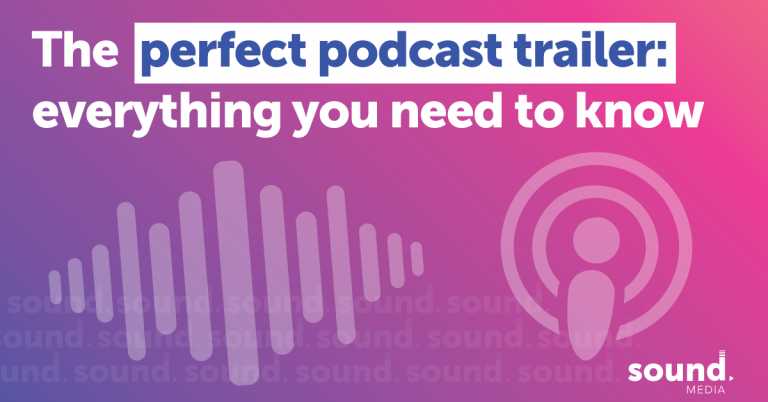Picture the scene – you’re at the cinema, the film is due to start in a few minutes. On comes the trailer for the new Star Wars movie… and it looks EPIC. Is there a more wonderfully exciting moment known to humankind?!
OK that might just be me, but herein lies a point – trailers are ace. They work really well for movies and TV shows, and they can for podcasters too.
I’d go as far as to say that a good trailer is an absolutely essential part of the modern podcast. It has a ton of benefits and anyone who skips doing one is only really kidding themselves.
This is a subject we covered in this month’s Pod Almighty episode, where Ellie and I talked through all the good stuff about trailers, outlined a nice simple template idea, along with some hints and tips. Take a listen here if you fancy:
You can also listen to it by searching Pod Almighty in your podcast app, or just head here to listen online and get all the links there.
In this blog I want to go a little deeper into a couple of the areas and replicate that template so it’s there in black and white for you.
What is a podcast trailer?
Fair question – what even is this podcast trailer thing you keep waffling on about?
It’s usually between one and two minutes long. It shouldn’t be shorter than a minute, and I’d say the top end ceiling should be absolutely no longer than three minutes. Generally speaking, around a-minute-and-a-half is a really good sweet spot.
It should feature the podcast host’s voice (we’ll come onto WHAT to say a bit later on in the template) and it’s a good idea to have the music you’re using on your show sorted beforehand, so you can have that running in the background.
And that’s pretty much it – it isn’t any more complicated than that. 90 seconds, one voice, a bit of music.
Why make a trailer?
Ahhh, so what’s so great about this ‘ere trailer you ask? Let me outline a few of the benefits as I see them, in no particular order:
It is making an actual start
You’re producing some audio rather than writing things down or drawing up plans. It’s doing something practical and that feels like a huge hurdle to clear. Psychologically, that’s significant.
It sets down some style
It’s likely to be the first time that you can actually hear the style of your podcast start to take shape: how the music sounds underneath your voice, the overall tone, some of the elements of what you say.It gets you thinking about some of the key elements of your podcast, such as how you introduce yourself, your call to action (CTA) and how you sign off. These are all things that you’ll be doing in your full episodes and if you get them sounding great on your trailer, you can just replicate them in future podcasts.
It’s a good starting point for a listener
This is often overlooked but I think is a really key benefit. Think about being a podcast listener. Think about finding a show that you **might** be interested in. Think about making that decision about whether you’re willing to give up half an hour to listen to an episode. Then consider seeing the podcast has a 90 second second trailer. It’s a brilliant way for any potential listener to try you out without having to commit to a full episode.
Trailers are good tools for social media
You can post it for your followers to listen to, use it as a tool to promote ahead of your launch, and you can keep posting links to it even after you’ve launched. It’s a timeless promotional tool.
Similarly, it’s a good tool for when you’re approaching prospective guests
Rather than sending them a loooooong email with line after line of text, you can send them a link to your trailer so they can take a listen and get a full-colour feel for what the show is all about.
The practical benefit
It’s a brilliant practical tool for a lot of the under-the-hood work you have to do with your audio hosting and particularly getting your show onto platforms like Spotify and Apple Podcasts. You have to go through a one-time submission process to these apps but you need a piece of audio published first – rather than waiting for your episode to be done, you can complete it way in advance with your trailer, and then it’s done.
When is the right time to do a trailer?
In almost all cases, people do their trailer before their podcast launches. You’ll have gathered from the last section that some of the key benefits of a trailer are pinned to it being before the first episode – setting down style and using it to get approval from the different listening platforms, for example.
How far in advance is pretty wide open. You don’t want to cut things too tight, so maybe no less than a month before, but at the other end of the scale it could be anything up to three or four months.
I’ve known people take over six months from trailer to actual launch which to be honest isn’t really a huge problem, but does seem a little slow to me. We should be able to make progress more quickly.
What goes in it?
This brings us neatly to my sample template for a trailer. Let’s start by saying that some people choose to fully script out – word for word – their trailer, while others choose to go with bullet points. There isn’t a right or wrong, it’s just a case of what works best for you.
Then, here is what I’d suggest you include
Introduce yourself
The first thing to do is to tell me who you are. It’s the first time I’m meeting you, so it’s only polite. And I don’t necessarily just mean your name – you’ll probably want to frame that with the context of what you do which in turn links to why you’re doing this podcast
A flavour of the show
This is the main and most important part of your podcast, and the one which will be slightly different for everyone. Give me a flavour of your show – what’s it about, how does it work, who is on it, what will I get out of listening to it? How best to go about this really does depend on your exact style and format, but play around with a few ideas and remember that you’re aiming for a sweet spot of 90 seconds, so don’t make it too short but also avoid War and Peace territory.
Worth mentioning for some people that it might be right to do the flavour of the show before introducing themselves, depending how strong their ‘hook’ is, but I’d normally do it this way round.
Free
Premium ‘paid-for’ podcasts are a thing now and assuming that’s not a route you’re going down, I think it’s good practice to get the word free into your trailer script. It could be a line of its own (‘It’s free to listen’ or ‘the best bit is it’s free’ etc) or just shoe-horn the word in somewhere (‘in the free episodes…’). It doesn’t matter how, it’s just a really key word to include somewhere.
Frequency
If you know and are committed to it, tell me how often you’re doing episodes. Weekly, monthly, etc. Don’t worry if you’re not sure yet, you can miss this bit out.
Where I can find it
Where will this podcast be? You know the kind of stuff we’re talking about here – ‘you can find the show on Spotify, Apple Podcasts, or any of the other main podcast platforms’ or words to that effect. Think about if someone catches to your trailer on social media who has never listened to a podcast before – make it super easy to get them over that hurdle of listening for the first time.
CTA
OK, so I’ve listened through your trailer and I like the sound of your show. What now? What do you want me to do next? Is it to hit ‘follow’ (we steer clear of the word ‘subscribe’ on podcasts now), or maybe to go to your website, or perhaps to follow you on social media? Give me one, or at most two, clear and easy CTAs.
Sign off
You could just end on your CTA but it’s nice and friendly to sign off as well – ‘I’m looking forward to speaking to you again soon’ or something along kind of lines, maybe.
And that’s it really – everything you need to create a perfect podcast trailer.
Of course, some shows might need an extra line or two if there’s something very specific about their format which demands it, and that’s fine.
You’ll probably find after your record a first take that you’ll want to tweak some bits and redo it – that’s completely normal. Remember about how important those style elements are that you’re setting down. It’s worth taking the time to get it right. If it takes several attempts and re-writes, that’s healthy. It’s a good use of your time
Incidentally, we do a trailer recording service at Sound Media where we connect with you and do through the scripting, recording, editing and mixing of the trailer together giving you feedback all way along – if you think you’d benefit from that just get in touch
Top tips
Don’t make it future tense – because you’re likely to be doing this before you launch, there’s a temporation to do all this in the future tense – as if the show is coming soon. But your trailer remains a useful tool after launch, so it’s better to phrase it generically. ‘Each episode is’ rather than ‘each episode will be’, and so on.
It isn’t static – you can always redo your trailer a few months down the line if you find your show develops quickly and the trailer just isn’t that representative any more. Some people change theirs every six months routinely, dropping in a couple of really short clips from recent episodes, and that sounds great.
Don’t stray too far – it’s a trailer and it’s circa 90-seconds, remember. It ISN’T your full story or a ‘meet the host’ type thing. You might want to separately do a ‘bonus’ introductory episode or an ‘Episode 0’ where you can spend longer setting the scene of who you are and what brings you to this point. The trailer is short and sweet.
Anything we’ve forgotten here? If you have any hints and tips of your own please GET IN TOUCH and we’ll add them on.



